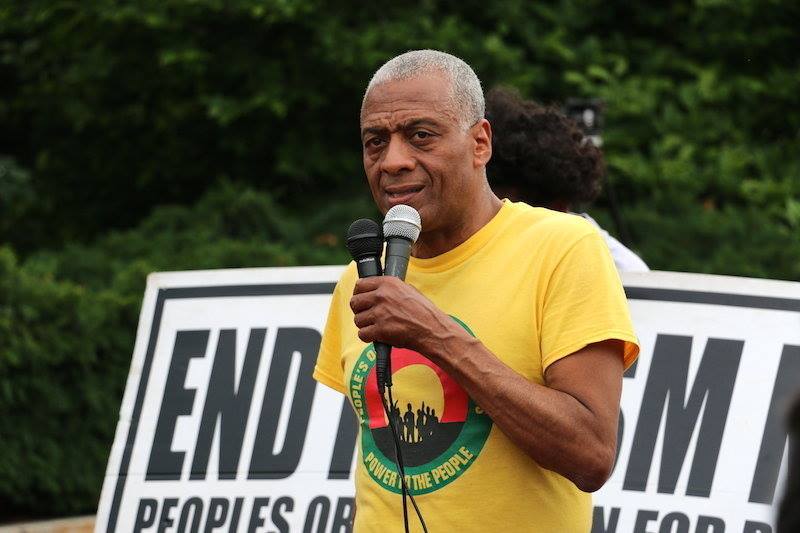Senate Candidate Hamm Soldiers on as He Celebates Sanders

Larry Hamm's history of radical, shift-of-power politics goes back to his days as a student organizer in Newark, and through the eras of numerous national progressive agenda standard bearers. His own street-level activism propelled him to run for the U.S. Senate in New Jersey this year on the Bernie Sanders ticket, and to participation on that phone call earlier today when he learned that Sanders intended to suspend his presidential campaign.
It hurt, maybe not as much as Jesse Jackson's drop outs in the 1980s, but that may be a function of wisdom in the processing of pain more than merely a gradation of discomfort born of disappointment, for Sanders meant for Hamm the activist maybe more than any other presidential candidate.
"Bernie helped to bring into view the undeniable fact that there is a left wing alive in the Democratic Party, which speaks to a significant portion of the American electorate, which endorses Medicare for all," Hamm, who also chaired the Bernie Sanders campaign in New Jersey, told InsiderNJ. "Bernie, by reshaping the debate, opened the door for people who were heretofore radical or socialist or without a party, and made a space for them in the Democratic Party. Also now, in the midst of this coronavirus crisis, we can see the need for Medicare for all."
No other Democratic presidential candidate achieved as much success as Sanders with an overtly socialist message, Hamm noted.
Barack Obama (2008) rejected Medicare for all.
Ralph Nader (2000) ran as a third party candidate.
Jackson (1984 and 1988) was ultimately pro-capitalism.
"Both Jackson and Sanders made an attempt to project forward the progressive radical perspective of the Democratic Party," said Hamm. "We can go back in history to WWII and pre WWII and there has been a center, right and left of the Democratic Party. The New Deal was a projection of the left wing of the Democratic Party. Both Jackson and Sanders saw themselves as part of a movement. Both made their goal trying to transform the Democratic Party from within. But what made Sanders clearly different even from Jackson was that he identified himself as a Democratic Socialist. Jesse Jackson never specifically identified himself as a Democratic Socialist. He certainly had a progressive platform, but Jackson did not attempt to project himself as anti-capitalism. Ideologically, Bernie Sanders was more explicitly expressive of the philosophy of Dr. King, even than Jackson."
Dr. King decried socialism for the rich and capitalism for poor people, and developed a bill of rights for the socially disadvantaged.
"Barack Obama did not represent the left wing of the Democratic Party," Hamm said. "He was liberal at best and a centrist at worst. I voted for Obama, and we in POP [People's Organization for Progress] endorsed him after much discussion, both in 2008 and in 2012. But we never saw Obama as Jesse Jacksion. He came out of the Democratic Party machine. Liberal, but very much of the corporate wing. What made Obama different was he was black. To even say there could be a black president was radical. That's what him the target of the racist right wing. That's why they hate him. He didn't deviate that much from the policies of Clinton. He spoke in liberal terms and his was an administration without scandal, as he projected a wholesome family image."
But Sanders, more than any other presidential candidate in Hamm's lifetime, amplified that movement progressive message to the greatest number. "He reached a peak, and no doubt after today someone else will come along to take us to another level," said the U.S. Senate candidate. "We need someone to take us to another level because we're backwards. Even England has a national healthcare system."
With Sanders officially gone now, Hamm said he intends to move forward with his own campaign for the U.S. Senate as the progressive New Jersey alternative to incumbent U.S. Senator Cory Booker (D-NJ). "I am not dropping out," said Hamm. "I have no plans to drop out. The whole damn system lined up against Bernie Sanders. They spent millions against him. That's why Mike Bloomberg ran - to oppose the progressive agenda for systemic change that Senator Sanders campained on.
"Politics is a raging sea," added the progressive candidate. "If I were 36 again and not 66, I would have a different, maybe more emotional reaction to what happened toay. But I'm sure it's a decision Bernie Sanders pondered over a great deal and discussed with people around him. It was a decision he thought was best, so I can't argue with him. He knows much more about what's going on with the campaign than I do. I wanted him to stay in the race through the primary, just as he did in 2016, but clearly there are circumstances - the coronavirus pandemic - that changed political conditions."
Hamm acknowledged that Super Tuesday was a sobering moment for the Sanders Campaign, when other Democratic presidential candidates dropped out and backed Sanders' rival Joe Biden. Still, he celebrated his presidential candidate's decision, despite suspending his campaign, to leave his name on the ballot in a bid to collect party delegates, and insisted on extolling and yes, at the state level embodying, the progressive agenda Sanders championed as a particularly historically relevant champion.





